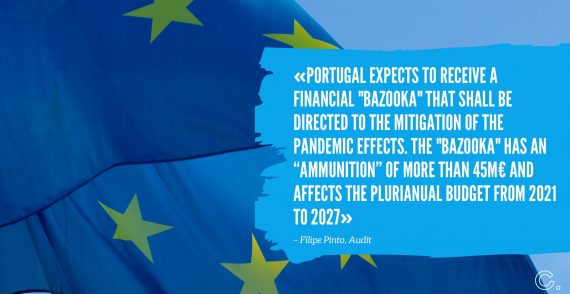The “Bazooka” and the Recovery and Resilience Plan
Portugal has come to stand out as one of the most cautious countries, with regard to measures to combat the economic problems caused by the pandemic. Despite having placed large-scale support on the ground, such as the Simplified Lay-off, the credit lines for the activities most affected by the pandemic and confinement, the new social benefits and, even a greater investment in the National Healthcare Service, Portugal stands out for being the most prudent country when compared to the rest of Europe. Data revealed by the OECD showed that in a group of 40 evaluated economies, Portugal was the second country that registered the greatest economic damage between the beginning and the end of the year 2020. Pointing to a fall in the economy, in 2020, of about 8,4 % and only 1,7% growth in 2021. The European Commission manages to be even more pessimistic than the OECD, placing Portugal in the group of countries that will take the longest to recover its normal level of wealth production, considering, therefore, that the Portuguese economy will be one of the most affected by the pandemic, since the country is extremely dependent on the sectors most affected by the measures to combat the pandemic: tourism and restaurants. However, Portugal is expecting to receive a financial “bazooka” that intends to target to combat the mitigation of post-pandemic effects. This “bazooka” had an “ammunition” of more than 45 billion euros (30 billion euros from the EU budget and 15,3 billion in grants), which combines the pluriannual budget from 2021 to 2027. In this context, Portugal developed a Recovery and Resilience Plan (RRP) that is based on three main aspects: Resilience, Climate Transition and Digital Transition. In terms of Resilience, the intention is to stimulate the economy and face the effects of the exogenous shock caused by the pandemic and prepare the country for further future shocks. For this, it is necessary to formulate and direct measures for the reduction of social vulnerabilities (National Healthcare System, Social Housing, etc.), the strengthening of the national productive sector (Investment and Innovation), the retention and creation of jobs (Qualifications and Skills) and ensure a competitive and cohesive territory (Infrastructure, Forest and Water Management). As such, these are the key pillars in terms of Resilience: The Climate Transition aspect is also unavoidable, since climate change is factual and indisputable. It is necessary to respond to these changes and mitigate the effects that pollution, in general, has caused. The RRP is based, therefore, on measures that provide a reduction in greenhouse gas (GHG) emissions, focusing on a strategy of sustainable mobility, decarbonization of the industry, betting on the bioeconomy and renewable energies. 


